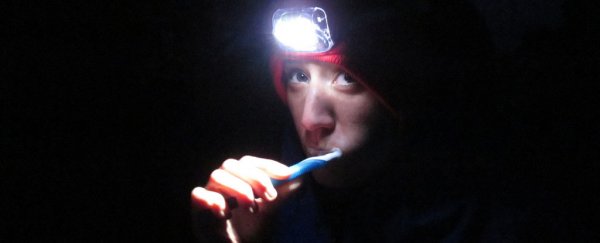Here's what the end of the day looks like for most people: directly before curling up in bed to catch some shut-eye, you brush your teeth in front of your bathroom mirror, and given that it's night-time, you're probably basking in the bright, artificial ambience of your bathroom's electric lights.
According to science, we shouldn't be doing this. By exposing yourself to bright artificial lighting just before you go to bed, you're effectively telling your body it's time to wake up rather than time to relax.
"Sleep is the single most important behaviour that we do. Across our lifespans 36 percent of our life will be spent sleeping," said Russell Foster, professor of circadian neuroscience at Oxford University in the UK, as reported by Sarah Knapton at The Telegraph.
"Often people will turn their lights down at night which helps to get the body ready for sleep, but then they will go and brush their teeth and turn their bathroom light on. That is very disrupting. I often think someone should invent a bathroom mirror light which has a different setting for night-time."
According to Foster, we confuse our bodies, especially in winter when the days are shorter, due to our overall reliance on electric lights. Our bodies' natural expectations are to be surrounded by very bright daylight in the middle of the day, then shrouded in relative darkness during the night.
However, as we live and work primarily inside buildings with artificial lighting running throughout both day and night, the light we're exposed to at all times is rather less than ideal: dimmer during the day than sunlight, and brighter at night than darkness. One consequence is a negative impact on sleep.
"We have this master clock ticking on the brain and each individual cells have their own little clock, so it's rather like the conductor of an orchestra producing a signal which the rest of the body takes a cue from. There is a beautiful symphony of rhythms," said Foster. "But we live in these dimly-lit caves, both at home and in our offices, which are far less bright than natural light, even on a cloudy day."
The implications could be more serious than whether or not you get a good night's sleep. A study earlier in the year found that disruptions to normal biological and seasonal rhythms due to the overuse of electrical lighting and artificial climate controls put people at increasing risks in terms of morbidity and mortality.
So what's the solution? Foster says, "it is so important to get outside, particularly in the morning to reset the body clock." In other words, expose yourself to some of the peak brightness of natural light during the day (safely, of course – even sitting by a window in the shade is better than nothing).
And at the end of the day, dim your lights if you can, avoid coffee, and don't overuse glowing electronic devices like smartphones and tablets, especially in bed.
And lastly, try brushing your teeth in the dark. Who knows? You might find it works wonders.
